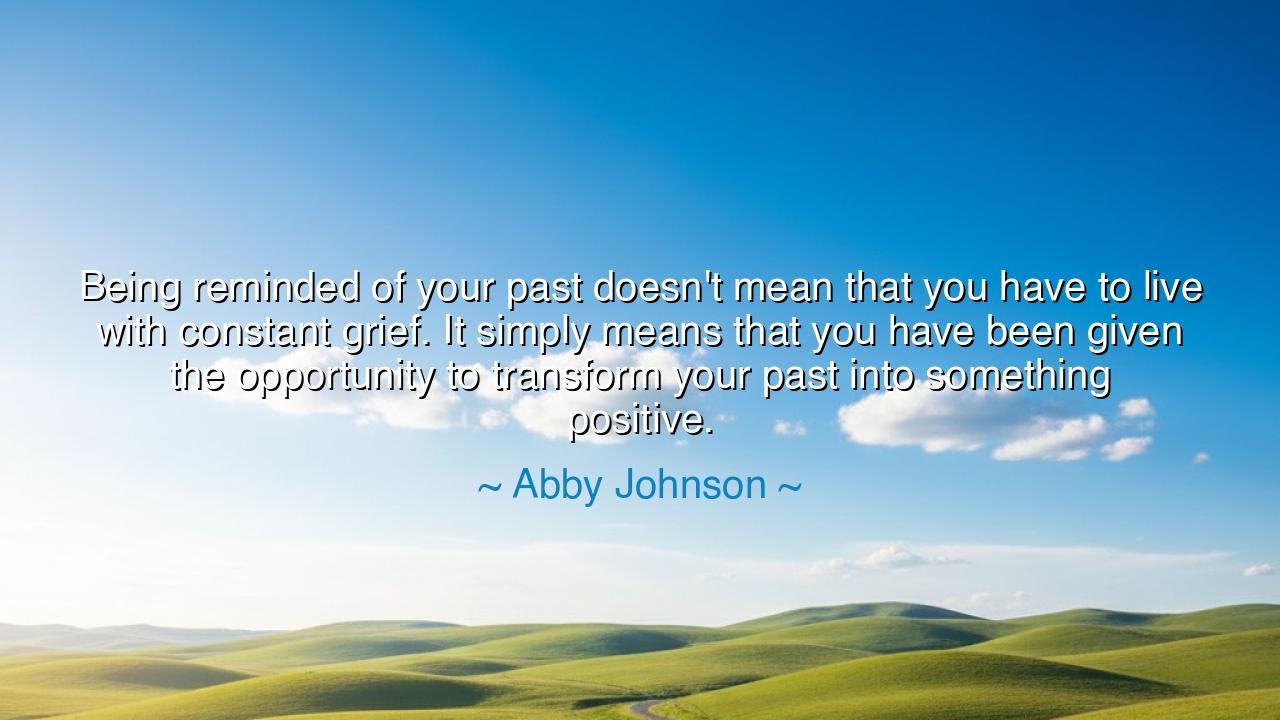
Being reminded of your past doesn't mean that you have to live
Being reminded of your past doesn't mean that you have to live with constant grief. It simply means that you have been given the opportunity to transform your past into something positive.






Hear the words of Abby Johnson, who speaks with the weight of experience: “Being reminded of your past doesn’t mean that you have to live with constant grief. It simply means that you have been given the opportunity to transform your past into something positive.” These words flow like a healing river, for they remind us that memory is not a chain to enslave us, but a tool to shape us. To be confronted with the shadows of yesterday is not a curse, but a summons to bring light where once there was darkness.
The origin of this saying springs from Johnson’s own journey. Once aligned with paths she later rejected, she found herself burdened with memories that could have crushed her spirit. Yet instead of being imprisoned by regret, she chose to transform her story into testimony, turning her own wounds into wisdom for others. Her words are not mere counsel, but living proof that the past is not final, and that grief, while heavy, can become the seedbed of growth.
History bears witness to this same truth. Consider the life of Malcolm X. His youth was marked by crime, prison, and despair. Many would have expected him to remain chained by those beginnings. Yet he used the fire of his past not as fuel for destruction, but as the forge of transformation. He emerged a leader, a voice for justice, a man who inspired millions. His grief was not buried but reshaped into vision. His past, once a burden, became the very foundation of his strength.
The deeper meaning of Johnson’s words is that life does not demand that we erase what has been, but that we reframe it. To carry scars does not mean to remain wounded; it means to carry proof that we survived. Every failure, every shame, every loss can become an altar of transformation, if we refuse to bow to despair and instead rise with the determination to create something positive.
The lesson for us is clear: do not fear reminders of what you were. When an old wound stirs, when a voice from the past returns, see it not as a ghost to haunt you, but as a messenger calling you toward growth. Let memory become your teacher, not your tyrant. In this way, even sorrow is sanctified, and even grief can yield glory.
To the youth, I say: your mistakes do not define you, but they can refine you. To the weary, I say: do not bury your memories in shame—lift them up, examine them, and let them teach you wisdom. To the elders, I say: share your transformed past with the young, so they may learn not only from your triumphs but also from your struggles.
Practical action lies before us: when the past rises to your mind, pause and ask, “How can this memory serve my present?” Write your story, not to dwell on pain, but to reveal the journey of transformation. Offer kindness to those still walking the path you once walked. In this way, grief becomes fuel for compassion, and your own scars become lamps to guide others through the night.
Thus Abby Johnson’s words stand as a teaching for the ages: the past is not your prison, but your raw material. To be reminded of it is not to be cursed, but to be entrusted with the chance to build anew. Transform it, and you will find not constant grief, but enduring strength. And in this transformation, your life itself will become a testament that even the darkest beginnings can yield the brightest light.






DTdat tran
This quote speaks to the potential for personal growth through reflection on the past. The idea that we don’t have to live in constant grief is comforting, but it also raises questions about how we approach healing. How can we ensure that our past informs us in a positive way rather than keeping us stuck? What steps can we take to make sure we’re turning painful memories into lessons or sources of strength?
TQTue Quyen
Abby Johnson’s message is incredibly empowering—reminding us that our past doesn’t define us. The opportunity to transform painful experiences into something positive feels like a powerful tool for personal growth. But how realistic is it to completely shift the way we see our past, especially when it holds deep emotional weight? Is it something we can learn to do over time, or does it take a conscious effort to change our perspective?
LBlu bu
This quote really makes me think about how we often view the past. It’s true that being reminded of what we’ve gone through shouldn’t keep us in a state of sorrow. Instead, we can use those reminders as stepping stones for growth. But how do we ensure we’re not simply brushing off the pain in the process? Can transformation be achieved without confronting the tough emotions that come with it?
BTTran Huynh Bao Tran
I love this perspective on remembering the past. It’s so easy to get stuck in grief or regret when we think about what’s happened before, but Abby Johnson offers a hopeful outlook. The idea that we can transform our past into something positive is empowering. But how do we actually go about doing that? Is it more about changing our mindset, or is there an active process of healing involved?